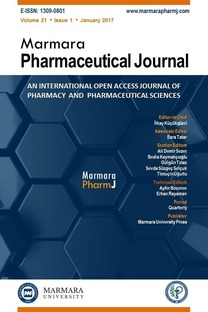Medication adherence and clinical outcomes in type 2 diabetes mellitus patients with depression: A prospective interventional study
___
[1] Golden SH, Lazo M, Carnethon M, Bertoni AG, Schreiner PJ, Roux AV, Lee HB, Lyketsos C. Examining a bidirectional association between depressive symptoms and diabetes. Jama. 2008; 299(23): 2751–2759. [CrossRef][2] Genuth S. A case for blood glucose control. Adv Intern Med. 1995; 40: 573–623. [CrossRef]
[3] Reichard P, Nilsson BY, Rosenqvist V. The effect of long-term intensified insulin treatment on the development of microvascular complications of diabetes mellitus. N Engl J Med. 1993; 329(5): 304–309. [CrossRef]
[4] Gavard JA, Lustman PJ, Clouse RE. Prevalence of depression in adults with diabetes: an epidemiological evaluation. Diabetes Care. 1993; 16(8): 1167–1178. [CrossRef]
[5] Wing RR, Marcus MD, Blair EH, Epstein LH, Burton LR. Depressive symptomatology in obese adults with type II diabetes. Diabetes Care. 1990; 13(2): 170 – 172. [CrossRef]
[6] Jacobson AM, De Groot M, Samson JA. The effects of psychiatric disorders and symptoms on quality of life in patients with type I and type II diabetes mellitus. Qual Life. 1997; 6(1): 11–20. [CrossRef]
[7] Hanninen JA, Takala JK, Keinanen-Kiukaanniemi SM. Depression in subjects with type 2 diabetes: predictive factors and relation to quality of life. Diabetes Care. 1999; 22(6): 997–998. [CrossRef]
[8] Gary TL, Crum RM, Cooper Patrick L, Ford D, Brancati FL. Depressive symptoms and metabolic control in AfricanAmericans with type 2 diabetes. Diabetes Care. 2000; 23(1): 23–29. [CrossRef]
[9] Ciechanowski PS, Katon WJ, Russo JE. Depression and diabetes: impact of depressive on adherence, function, and costs. Arch Intern Med. 2000;160(21):3278-3285. [CrossRef]
[10] Lin EH, Katon W, Von Korff M, Rutter C, Simon GE, Oliver M, Ciechanowski P, Ludman EJ, Bush T, Young B. Relationship of depression and diabetes self-care, medication adherence, and preventive care. Diabetes Care. 2004; 27(9): 2154–2160.
[11] Culbertson FM. Depression and gender- An international review. Am Psychol. 1997; 52(1): 25-31. [CrossRef]
[12] A li S, Stone MA, Peters JL, Davies MJ, Khunti K. The prevalence of co-morbid depression in adults with type 2 diabetes: a systematic review and meta-analysis. Diabet Med. 2006; 23(11): 1165-1173. [CrossRef]
[13] Eren I Erdi O, Ozcankaya R. Relationship between blood glucose control and psychiatric disorders in type II diabetic patients. Türk Psikiyatri Derg. 2003; 14(3): 184-191.
[14] Hillary R Bogner, Knashawn H Morales, Heather F de Vries, Anne R Cappola. Integrated management of Type 2 diabetes mellitus and depression treatment to improve medication adherence: A randomized controlled trial. Ann Fam Med. 2012; 10(1):15-22. [CrossRef]
- ISSN: 1309-0801
- Yayın Aralığı: Yılda 6 Sayı
- Başlangıç: 1985
- Yayıncı: Marmara Üniversitesi
Mustafa ÇELEBİER, Engin KOÇAK, Ayşegül DOĞAN, Sacide ALTINÖZ, Nursabah Elif BAŞCI
Muhammed İhsan HAN, Hatice BEKÇİ, Ahmet CUMAOĞLU, Ş. Güniz KÜÇÜKGÜZEL
Ahmet HAŞİMOĞLU, Shantanu B. GHODKE
Yulia POLKOVNIKOVA, Alexandr LENSHIN, Pavel SEREDIN, Kseniya KORYANOVA
Evren Homan GÖKÇE, Mustafa Sinan KAYNAK, Aysu YURDASİPER, Neslihan ÜSTÜNDAĞ-OKUR
The effect of compression on solid-state properties of desloratadine and multicomponent crystal
Ahmad AINUROFIQ, Rachmat MAULUDIN, Diky MUDHAKIR, Sundani Nurono SOEWANDHI
Sakine ATİLA KARACA, Duygu UĞUR YENİCELİ
Synthesis and antimicrobial effects of cyclotriphosphazenes containing monocarbonyl curcumin analogs
Mine GÜL ŞEKER, Tuğçe AKBAL, Devrim ATİLLA, Neslihan AVŞAR, Hanife İBİŞOĞLU
Synthesis and evaluation of new benzoxazole derivatives as potential antiglioma agents
MEHLİKA DİLEK ALTINTOP, Gülşen AKALIN ÇİFTÇİ, Halide TEMEL EDİP
Development and validation of a GC-FID method for determination of cocaine in illicit drug samples
